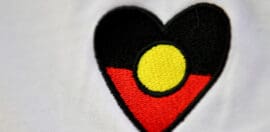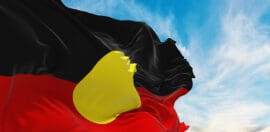Limited progress on Closing the Gap, as Australia mourns a legend

Picture: ERIK ANDERSON, AAP
1 August 2022 at 4:49 pm
Limited data means the lack of a clear picture of how we are progressing on Closing the Gap, as Australia mourns one of its foremost campaigners for justice for First Nations.
The latest Closing the Gap data is in, and it paints an incomplete picture of how Australia is progressing on targets to improve the health and wellbeing of First Nations people.
The second Annual Data Compilation Report, monitoring progress under the National Agreement on Closing the Gap, was released in late July by the Productivity Commission.
The Agreement features a number of Priority Reforms, which all Australian governments and the Coalition of Aboriginal and Torres Strait Islander Peak Organisations have committed to working on and measuring.
The news comes as Australia mourns Gunditjmara and Bundjalung Elder, activist and musician, Archie Roach AM, after he passed away aged 66 after a long illness.
As well as being a much-loved singer-songwriter, Roach was known within the sector for his activism and support of community initiatives.
Through the Archie Roach Foundation, he worked closely with the youth justice system to pass on his passion for music and inspire other incarcerated young people.
The foundation was also instrumental in setting up performer Nancy Bates as Indigenous wellbeing program coordinator, to work with young Indigenous people in youth detention through a cultural and arts program.
Roach had previously spoken about the importance of music for healing: “Over the years if I didn’t have music I would have had no other outlet to express myself except negatively. Music has always been a healing force to bring me out of that dark space.”
Data deficiency
Development of the Close the Gap measurements for reforms is still underway; although the agreement commenced in 2020, the report notes that data on some of its outcomes is not yet available.
Additionally, the agreement identifies 17 socioeconomic outcomes related to the rights, health and quality of life of First Nations people. Limited information on progress towards these is currently available, according to the report.
For those where data is available, four outcomes are on track and five are not.
The four that are on track are:
- Healthy birthweight of babies – 89.5 per cent of babies were born with a healthy birth weight in 2019, an increase from 88.8 per cent in 2017.
- Enrolment of children in preschool – 96.7 per cent of children were enrolled in preschool in 2021, an increase from 76.7 per cent in 2016.
- Youth detention rates – 23.2 per 10,000 young people were in detention in 2020-21, a decrease from 31.9 per 10,000 young people in 2018-19.
- Land mass subject to rights and interests – 4,027,232 square kilometres of land were subject to First Nations people’s rights and interests in 2021.
The five that are not on track are:
- Children commencing school developmentally on track – in 2021 34.3 per cent of Aboriginal and Torres Strait Islander children commenced school developmentally on track, a decrease from 35.2 per cent in 2018.
- Out-of-home care – the rate of Aboriginal and Torres Strait Islander children aged between 0 and 17 years in out-of-home care increased from 54.2 per 1000 children in 2019 to 57.6 per 1000 in 2021.
- Adult imprisonment – the rate of Aboriginal and Torres Strait Islander people in prison increased from 2142.9 per 100,000 of the adult population in 2019, to 2222.7 per 100,000 of the adult population at 30 June 2021.
- Deaths by suicide – the suicide rate in 2020 for Aboriginal and Torres Strait Islander people in NSW, Queensland, WA, SA and the NT combined was 27.9 per 100 000 people, an increase from 25 per 100 000 people in 2018.
- Sea country subject to rights and interests – In 2021, 90,555 square kilometres of sea country were subject to First Nations people’s rights or interest, an increase from 90,252 in 2020.
The report notes that these assessments should be used with caution as they are based on limited data.
“It is still early days, but monitoring under this Agreement will look to show whether the actions committed to have occurred, and if the life outcomes for Aboriginal and Torres Strait Islander people have improved,” said Commissioner Romlie Mokak on the release of the report.
“While it may be some years before we know for sure whether this most recent Agreement is working to improve people’s lives, progress will become clearer with each year of reporting.”
A “mixed result”
The National Aboriginal and Torres Strait Islander Legal Service (NATSILS) is leading work on outcomes 10 and 11 of the Agreement, which focus on reducing the overrepresentation of adults and young people in the criminal justice system.
Executive officer Jamie McConnachie said the latest report shows that justice policy should be led by Aboriginal and Torres Strait Islander people.
“What is evident is that Aboriginal and Torres Strait Islander Legal Services deliver support in communities around the country every day and while we know what our communities need, there must be a commitment from government to deliver these outcomes, true partnership and accountability functions.
“We have a right to culture. What needs to be in reverence is the principle that culture is a strengthening agent and that should underpin the delivery of services, policy and legislation that affects Aboriginal and Torres Strait Islander People,” she said.
National advocacy body for Aboriginal and Torres Strait Islander children, SNAICC, said the data showed a “mixed result” on reaching targets related to children and young people.
CEO Catherine Liddle welcomed the news that more children were now enrolled in preschool, but said it was “very concerning” to see the decrease in children assessed as being developmentally on track.
“This demonstrates pretty clearly that focusing just on children being enrolled in pre-school isn’t working for Aboriginal and Torres Strait Islander children. All the evidence shows that we need to focus earlier on children aged 0-3,” she said.
She added that youth detention rates for First Nations people were “still awful”.







